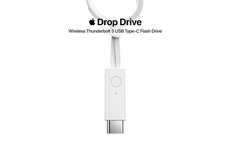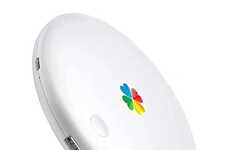
The iStick Flash Drive is the First Ever Lightning-to-USB Flash Drive
Rahul Kalvapalle — May 23, 2014 — Tech
References: kickstarter & gizmag
The iStick flash drive is claimed to be the world's first Lightning-to-USB flash drive. This device hopes to get rid of the problem faced by iPhones and iPads in that they don't come with USB ports. iPhone and iPad users can use Lightning-to-USB cables, email or cloud transfers to move files, but the iStick makes things a lot easier.
Unlike cables, the iStick flash drive can actually store information. This means you can load files from your iPhone and then access them on your computer directly from the stick.
It's also a lot quicker than loading to and from clouds, and doesn't require internet access. Users don't have to set up an account, and so don't need to harbor privacy or security concerns.
Unlike cables, the iStick flash drive can actually store information. This means you can load files from your iPhone and then access them on your computer directly from the stick.
It's also a lot quicker than loading to and from clouds, and doesn't require internet access. Users don't have to set up an account, and so don't need to harbor privacy or security concerns.
Trend Themes
1. Lightning-to-usb Flash Drives - Developing customizable and compact Lightning-to-USB flash drives can disrupt the market for file transfer solutions.
2. Direct Mobile-to-computer File Transfer - Creating faster and more efficient ways for users to transfer files from their mobile devices to their computers without using cloud storage or cables can revolutionize the efficiency of file sharing.
3. Privacy and Security-centered File Sharing - Innovations in file sharing devices that prioritize user privacy and security over convenience have the potential to disrupt the market for file transfer solutions.
Industry Implications
1. Consumer Electronics - Consumer electronics manufacturers can innovate and produce more efficient and secure file transfer devices to satisfy the needs of users for seamless integration of devices and platforms.
2. Cloud Storage - Cloud storage companies can develop privacy-focused, direct-to-device file transfer solutions to remain competitive and cater to the preferences and concerns of privacy-sensitive users.
3. Cybersecurity - Tech companies can create sophisticated cybersecurity systems and applications to protect files and personal information as users increasingly shift towards mobile devices for data transfer and sharing.
4.6
Score
Popularity
Activity
Freshness















